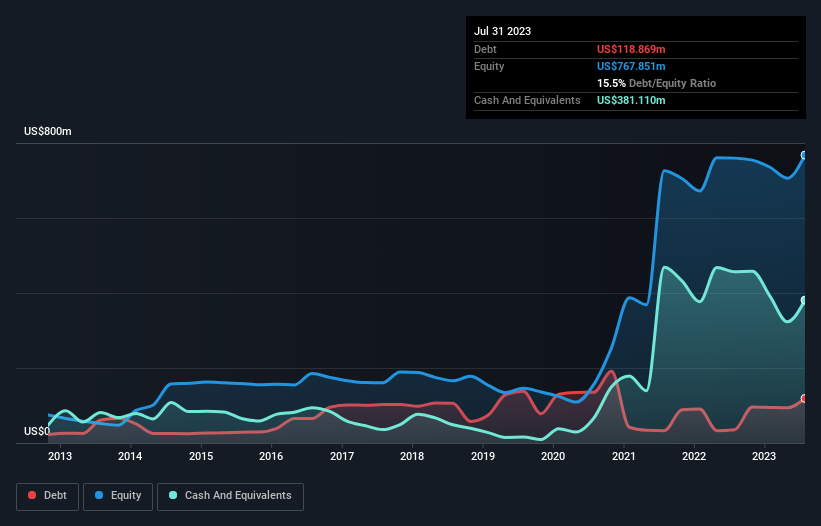- United States
- /
- Electrical
- /
- NasdaqGM:FCEL
Health Check: How Prudently Does FuelCell Energy (NASDAQ:FCEL) Use Debt?

Some say volatility, rather than debt, is the best way to think about risk as an investor, but Warren Buffett famously said that 'Volatility is far from synonymous with risk.' So it seems the smart money knows that debt - which is usually involved in bankruptcies - is a very important factor, when you assess how risky a company is. We note that FuelCell Energy, Inc. (NASDAQ:FCEL) does have debt on its balance sheet. But should shareholders be worried about its use of debt?
What Risk Does Debt Bring?
Debt assists a business until the business has trouble paying it off, either with new capital or with free cash flow. If things get really bad, the lenders can take control of the business. However, a more frequent (but still costly) occurrence is where a company must issue shares at bargain-basement prices, permanently diluting shareholders, just to shore up its balance sheet. By replacing dilution, though, debt can be an extremely good tool for businesses that need capital to invest in growth at high rates of return. When we examine debt levels, we first consider both cash and debt levels, together.
See our latest analysis for FuelCell Energy
How Much Debt Does FuelCell Energy Carry?
The image below, which you can click on for greater detail, shows that at July 2023 FuelCell Energy had debt of US$118.9m, up from US$35.5m in one year. But it also has US$381.1m in cash to offset that, meaning it has US$262.2m net cash.

How Strong Is FuelCell Energy's Balance Sheet?
According to the last reported balance sheet, FuelCell Energy had liabilities of US$59.0m due within 12 months, and liabilities of US$118.4m due beyond 12 months. Offsetting these obligations, it had cash of US$381.1m as well as receivables valued at US$29.1m due within 12 months. So it can boast US$232.8m more liquid assets than total liabilities.
This luscious liquidity implies that FuelCell Energy's balance sheet is sturdy like a giant sequoia tree. Having regard to this fact, we think its balance sheet is as strong as an ox. Succinctly put, FuelCell Energy boasts net cash, so it's fair to say it does not have a heavy debt load! There's no doubt that we learn most about debt from the balance sheet. But it is future earnings, more than anything, that will determine FuelCell Energy's ability to maintain a healthy balance sheet going forward. So if you're focused on the future you can check out this free report showing analyst profit forecasts.
In the last year FuelCell Energy wasn't profitable at an EBIT level, but managed to grow its revenue by 33%, to US$140m. With any luck the company will be able to grow its way to profitability.
So How Risky Is FuelCell Energy?
We have no doubt that loss making companies are, in general, riskier than profitable ones. And in the last year FuelCell Energy had an earnings before interest and tax (EBIT) loss, truth be told. Indeed, in that time it burnt through US$219m of cash and made a loss of US$123m. Given it only has net cash of US$262.2m, the company may need to raise more capital if it doesn't reach break-even soon. With very solid revenue growth in the last year, FuelCell Energy may be on a path to profitability. By investing before those profits, shareholders take on more risk in the hope of bigger rewards. The balance sheet is clearly the area to focus on when you are analysing debt. But ultimately, every company can contain risks that exist outside of the balance sheet. These risks can be hard to spot. Every company has them, and we've spotted 3 warning signs for FuelCell Energy (of which 1 is a bit concerning!) you should know about.
If, after all that, you're more interested in a fast growing company with a rock-solid balance sheet, then check out our list of net cash growth stocks without delay.
If you're looking to trade FuelCell Energy, open an account with the lowest-cost platform trusted by professionals, Interactive Brokers.
With clients in over 200 countries and territories, and access to 160 markets, IBKR lets you trade stocks, options, futures, forex, bonds and funds from a single integrated account.
Enjoy no hidden fees, no account minimums, and FX conversion rates as low as 0.03%, far better than what most brokers offer.
Sponsored ContentNew: AI Stock Screener & Alerts
Our new AI Stock Screener scans the market every day to uncover opportunities.
• Dividend Powerhouses (3%+ Yield)
• Undervalued Small Caps with Insider Buying
• High growth Tech and AI Companies
Or build your own from over 50 metrics.
Have feedback on this article? Concerned about the content? Get in touch with us directly. Alternatively, email editorial-team (at) simplywallst.com.
This article by Simply Wall St is general in nature. We provide commentary based on historical data and analyst forecasts only using an unbiased methodology and our articles are not intended to be financial advice. It does not constitute a recommendation to buy or sell any stock, and does not take account of your objectives, or your financial situation. We aim to bring you long-term focused analysis driven by fundamental data. Note that our analysis may not factor in the latest price-sensitive company announcements or qualitative material. Simply Wall St has no position in any stocks mentioned.
About NasdaqGM:FCEL
FuelCell Energy
Manufactures and sells stationary fuel cell and electrolysis platforms that decarbonize power and produce hydrogen.
Flawless balance sheet low.
Similar Companies
Market Insights
Community Narratives



